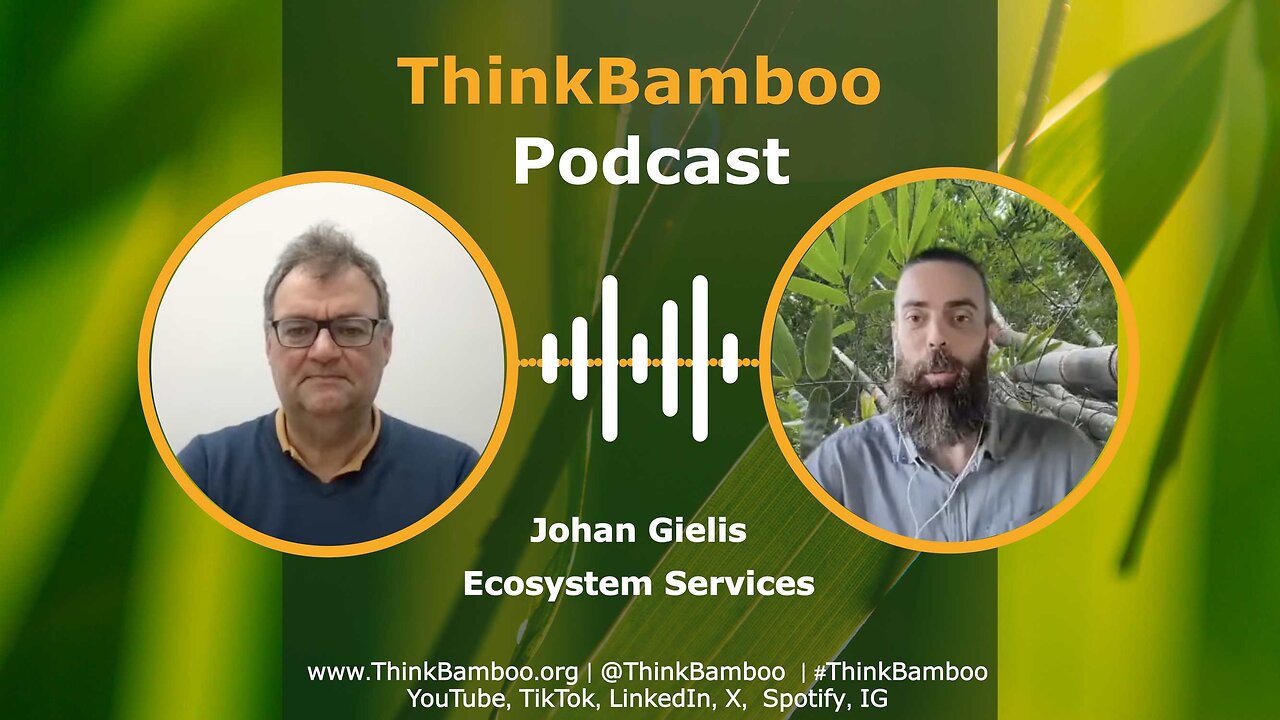Premium Only Content

Ecosystem 🌍 Services Facts With 🎋 Bamboo Expert Johan Gielis
#thinkbamboo Podcast : Se.1, Ep.15 -- Johan Gielis, Bamboo Expert | https://www.thinkbamboo.org/2023/08/07/ecosystem-services-facts-not-fiction-with-bamboo-expert/
-
Welcome to the ThinkBamboo Podcast! Today, we have the privilege of talking with Johan Gielis, a prominent figure in the bamboo industry since the 1980s. Johan actively involved himself in researching and developing bamboo micropropagation techniques. He has worked with bamboo in various capacities, from its genetics by developing successful bamboo propagation methods to physiology to exploring its ecosystem services and environmental impact. We actually met in person at the last #EuropeanBambooExpo 2023 in Dortmund Germany.
[00:00] Johan Gielis has been actively working with bamboo since the 80s
[06:17] Bamboo has ecosystem services and diverse habitats
[12:12] Bamboo transform degraded soils and contribute to favorable abiotic conditions
[18:14] Bamboo is a C4 plant and can sequester around 200 tons of carbon per hectare
[23:29] Bamboo can be beneficial for urban greening and regulating extreme weather
[28:33] Bamboo is highly efficient in water consumption - low water footprint
[33:51] Bamboo adapts to survive in almost any environment
[39:03] Bamboo has similar carbon sequestration properties as Chinese fur, and it uses half the water.
----
Background: From Horticulture to Bamboo Propagation
Johan Gielis, a horticultural engineer from Belgium, embarked on an extraordinary journey in the bamboo world. His expertise in developing a micropropagation system for bamboo proved revolutionary. Despite numerous challenges, Johan and his team managed to create a method suitable for temperate and tropical bamboos. This breakthrough led to the production of around 30 million bamboos worldwide.
Bamboo and its Impact on Ecosystem Services
While the public widely knows bamboo’s versatility and value in various industries, another aspect that often goes unnoticed is its ecosystem services. Bamboo plays a crucial role in growing in barren areas, such as lands devastated by mining, offering a chance for vegetation to flourish once more. This environmental benefit is significant, as the presence of vegetation leads to a cascade of ecosystem improvements. Obviously the ecosystem services of bamboo are not limited to regenerating degraded soil but this is a globally used application.
A literature review indicated that the carbon stock in vegetation (including understory species and other mixed vegetation) of Moso bamboo is within the range of 27-77 t C/ha. The majority of carbon appears to be sequestered in the arbour layer accounting for 84-99%; the shrub layer and the herbaceous layer accounted for very small contributions, especially in intensively managed bamboo forests. When looking at the whole ecosystem, including the soil, Moso bamboo forest ecosystem carbon storage capacity was reported to be between 102 t C/ha and 289 t C/ha, of which 19-33% was stored within the bamboo culms and vegetative layer and 67-81% stored within the soil layer (rhizomes, roots and soil carbon). This indicates that the soil layer carbon content is likely to be about 2-4 times greater than the vegetative layer. Bamboo ecosystems were found to have an equal or somewhat lower carbon stock (between 102- 288 t C/ha) when compared with other forest types (between 122 – 337 t C/ha). Source INBAR.
What are Ecosystem services?
Ecosystem services refer to the benefits that humans derive from ecosystems, including provisioning services (e.g., food, water, timber), regulating services (e.g., climate regulation, water purification), cultural services (e.g., recreation, spiritual value), and supporting services (e.g., soil formation, nutrient cycling). In regards to bamboo ecosystem services – we can think of the following services: Regulation: Climate change mitigation, Watershed services, Biodiversity conservation, Soil, Air, Reforestation, etc.
The Carbon Sequestration Mystery Unveiled
Johan delves into the misconception around bamboo’s carbon sequestration abilities. Many people assume that bamboo, being a water-loving plant, will dry out the environment. In reality, it is quite the opposite! Bamboo efficiently utilizes water, and its impressive photosynthesis capabilities make it an effective carbon sequestration agent. It continuously takes up CO2, even during dry periods, making it a valuable resource in mitigating climate change effects.
Water Use Efficiency: A Game-Changer
One of the most remarkable aspects of bamboo is its water use efficiency. Compared to other plants, bamboo is a champion in conserving water. Even in the dry season, bamboo can close its stomata, reducing moisture loss. Such a trait is invaluable in regions facing water scarcity. Its ability to thrive with limited water makes bamboo an essential player in sustainable agriculture and ecosystem preservation.
-
 54:23
54:23
Think Bamboo Podcast
4 months agoThought-provoking questions that reveal just how versatile bamboo truly is
131 -
 6:08:13
6:08:13
MissesMaam
12 hours agoCelebrating New Years 2025 💚✨
47.1K14 -
 3:22:32
3:22:32
PandaSub2000
3 days agoPlatformer ExtravaPandza | ULTRA BEST AT GAMES (Original Live Version)
60.8K29 -
 5:43:19
5:43:19
Bitcoin Magazine
14 hours agoLIVE: MICHAEL SAYLOR'S $100K NYE BITCOIN PARTY
106K12 -
 5:06:15
5:06:15
AirCondaTv Gaming
21 hours ago $37.80 earnedOnce Human - New Year. New Meta. Happy New Year!
142K14 -
 1:00:37
1:00:37
Bright Insight
10 days agoOlmec Heads are Evidence of Lost Ancient Advanced Civilization
140K229 -
 13:43
13:43
Cooking with Gruel
2 days agoCreamy Saffron Risotto
120K22 -
 18:38
18:38
DeVory Darkins
1 day ago $41.05 earnedTrump Makes HUGE Announcement that may spark GOP Battle
132K86 -
 2:13:05
2:13:05
The Nerd Realm
19 hours ago $12.49 earnedNew Years Eve! Fortnite Hunters w/ YOU! Creator Code: NERDREALM
96.5K6 -
 11:04:44
11:04:44
FusedAegisTV
1 day agoNYE Eve! - 2025 Incoming 🎉 - 12hr Variety Stream!
152K7